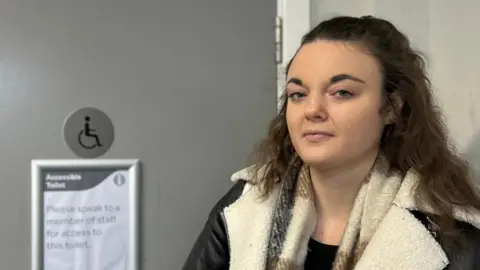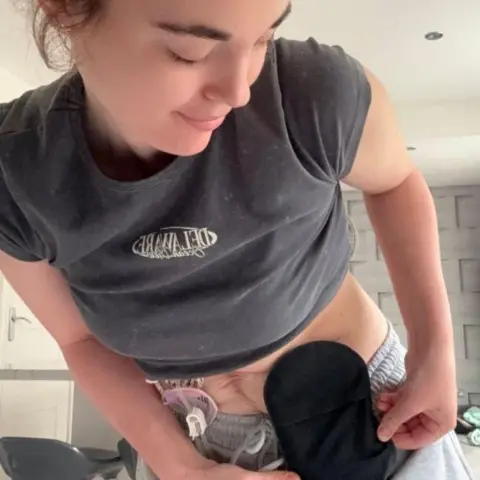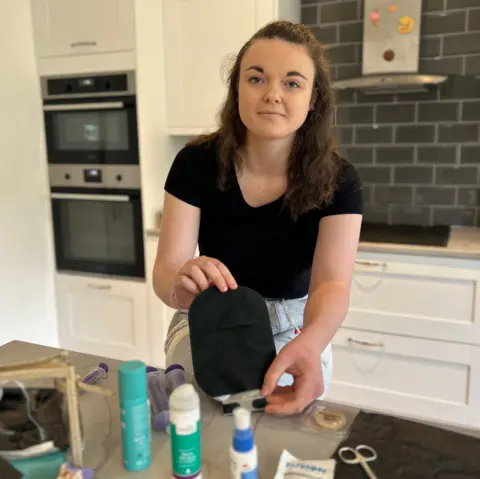'I've seen one stoma-friendly toilet in six years'
 BBC
BBC"In the six years I've had a stoma, I've had one toilet that's been completely accessible for me," says Emma Sellars. "It is a real downer to be honest."
The 23-year-old from Lincoln has been living with a permanent stoma bag since the age of 17.
But she says few people understand the condition.
"I say I have a stoma bag and they're like, what's that? Or they just assume that only older people have them.
"Anyone can have a stoma, right from birth."
For Emma, one of the biggest challenges is finding suitable facilities to empty the bag when she is out and about.
Often, she finds public toilets unsanitary and poorly equipped – and sometimes disabled facilities are inaccessible.
Now, Emma is campaigning for more stoma-friendly spaces and using her social media platform to gather support.
"You'd expect an accessible toilet to have everything any disabled person would need, but that's actually not the case," she says. "It's not good enough".
 Emma Sellars
Emma SellarsMore than 200,000 people are living with a stoma in the UK.
Emma had hers fitted after developing ulcerative colitis – a form of inflammatory bowel disease.
She went through "a whole lot of treatments", including chemotherapy, and was told she would die if she did not have a stoma bag fitted.
"I have an opening on the abdomen where part of the small bowel and large bowel is poked through to collect the waste into a bag," she says.
"At first it was really difficult to wrap my head around and adjust to. But as time's gone on I've learnt it's just a new way of living."
She takes stoma supplies with her when she goes out, but requires clean and well-equipped toilets to make changing the bags feasible.
More than 60% of people with stomas say the lack of such facilities negatively affects their daily lives, according to a survey by Colostomy UK in 2023.
 Emma Sellars
Emma SellarsThe charity has been working with businesses and other organisations to create more stoma-friendly toilets in public spaces such as railway stations, football grounds and visitor attractions.
Earlier this month, TransPennine Express announced that all of its accessible toilets in railway stations would have "stoma friendly" disposal facilities.
But at her local station in Lincoln, which is run by East Midlands Railway (EMR), Emma says the facilities are far from ideal and she struggles with disabled toilet access.
On a visit with the BBC, she finds the floor of the toilet "not very clean", with discarded paper towels. The sink is not the right height, though there is a shelf for her supplies and a suitable bin.
"If the floor's not clean, it makes that job incredibly difficult," she says. "It can make me incredibly anxious because I'm not able to change my bag or empty my bag, which can result in a bag leak."

Emma is backing a Colostomy UK campaign to make all public toilets stoma-friendly by including hooks, suitable shelf space, mirrors and disposal bins in every cubicle.
The charity believes this would give people "the confidence to live their lives normally".
A spokesperson says Colostomy UK wants the government to legislate to ensure people living with stomas and other conditions "do not face social exclusion and isolation".
In response to Emma's concerns, EMR says it does not have "any short-term plans to improve the toilet facilities at Lincoln station", but adds: "Consideration will be given to addressing these concerns when future improvement works are planned and costed."
For Emma, change cannot come quickly enough. "It just makes me incredibly angry," she says. "We are in 2025 now and this is still an issue."
Listen to highlights from Lincolnshire on BBC Sounds, watch the latest episode of Look North or tell us about a story you think we should be covering here.
